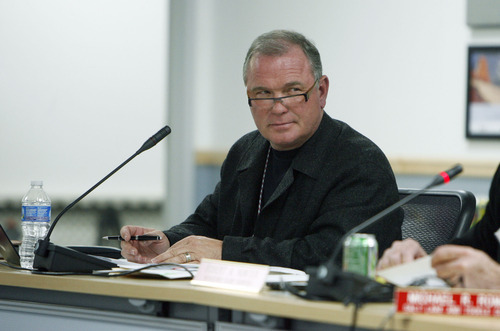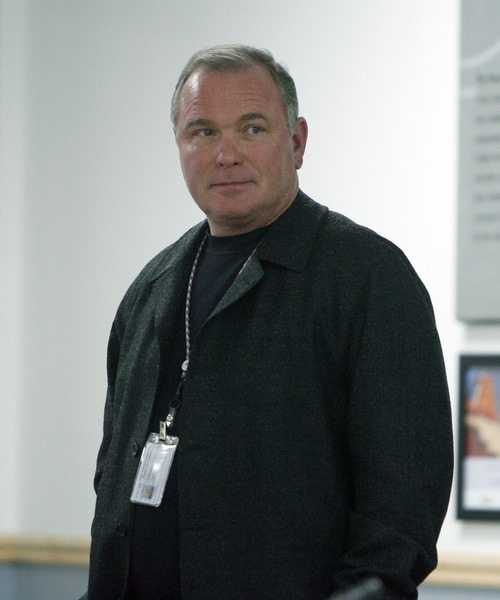This is an archived article that was published on sltrib.com in 2011, and information in the article may be outdated. It is provided only for personal research purposes and may not be reprinted.
Just as the Utah Attorney General's office confirms it is investigating developer Terry Diehl for maybe too-cozy deals with the Utah Transit Authority, Diehl is seeking anew to partner with the agency on whose board he served until just a few months ago.
Diehl confirmed Tuesday that he is exploring working with the agency to develop projects near transit stops. Agency policy normally bans former members from doing business with the agency for a year, but the board passed an exception for Diehl as a parting gift as he resigned.
The Attorney General's office confirms it is investigating whether Diehl broke the law when he was a UTA board member by misusing official information about the location of a potential commuter rail station in Draper by buying rights to develop land around it. A legislative audit earlier asserted that Diehl violated the law.
Also, back-up documents for that audit, just released through open-records law requests, show Diehl was paid "in the millions and less than $24 million" for those rights when he sold them. Diehl, however, says most of that was to reimburse costs, and that he "made very little" profit.
The Legislature's Transportation Interim Committee is scheduled to review on Wednesday the legislative audit that alleged that Diehl broke the law. Diehl, meanwhile, says he complied with all applicable conflict-of-interest laws and did nothing wrong.
Still, Paul Murphy, spokesman for Attorney General Mark Shurtleff, said Tuesday, "I can confirm that we have an ongoing investigation but can't say anything beyond that."
Despite that, Diehl confirmed to The Tribune that he is exploring jumping into more "transit-oriented developments" with UTA. A Tribune reporter noticed that Diehl and Jeff Vitek, to whom Diehl sold his controversial development rights near the Draper FrontRunner station, had signed in at UTA's front desk last week in entries next to each other.
When asked about that, Diehl said he went to pick up information about projects that UTA hopes to develop near transit stops. "I am evaluating sites where they are looking for a developer. I do have interest, and I am looking at what they want in a developer."
Diehl said he did not make those visits with Vitek, even though they had signed in next to each other in what appears to be the same handwriting. Both left blank on the register a portion to identify the purpose of a visit and what room they were visiting. Diehl said he did not see Vitek in that visit, and anything that Vitek may be doing with UTA is separate. Diehl had maintained in the audit that he and Vitek were not in business together when he sold his development rights to him.
Last May, UTA Board Chairman Greg Hughes, who is also a legislator, said the board pushed Diehl to resign to stop him from continuing to develop land around transit stops while serving on the board — which he said Diehl could legally do as long as he disclosed interests and recused himself from votes.
Hughes said the board wanted to avoid controversy from such continuing action. So to persuade Diehl to go, Hughes said, the board voted after a closed-door meeting to pass a resolution to waive the normal yearlong ban on former board members from doing business with it.
The legislative audit late last year said it could not substantiate allegations that Diehl influenced moving the Draper station to a site that would benefit him. But it said he may have violated the Public Transit Act, which it interprets as banning board members from acquiring any interest in a property when the UTA is contemplating an action that may affect that property.
The UTA general counsel, however, told auditors that the agency interprets the law differently, saying it believes that a violation "requires the use of non-public information" to make and benefit from such purchases.
The audit last year said Diehl had sold his controversial development rights for an "undisclosed amount." But interview notes released through an open-records request to The Tribune show that Diehl and his attorney, Thomas Karrenberg, did offer a general range of the sale price.
"Terry's attorney would not provide us the agreement between Diehl and Vitek but the amount Terry was compensated was in the millions and less than $24 million. Terry was reimbursed for his planning, surveying, and engineering efforts to develop the property as well as his attorney's fees and a consultant fee," the notes said.
Diehl told The Tribune that most of the money he was paid was for reimbursements. "I made very little money and didn't make any millions," he said. "I guarantee you that if I had made $24 million, you would be calling me in Mexico where I would be living on a beach."
While the legislative audit had suggested referring the matter to the attorney general, the Legislative Audit committee — consisting of the Legislature's top four leaders — declined to do so, noting that the audit said Diehl appeared to have done all that was asked of him by UTA lawyers to disclose any conflicts of interest. Now, the attorney general says it is looking into it anyway.
Diehl told the Tribune on Tuesday, "I complied with all applicable laws for conflict of interest. I don't understand why I am being targeted. I think it is a vendetta by environmental activists," who he says did not like proposed FrontRunner sites and development around them.
Hughes on Tuesday said that UTA itself had requested the Attorney General's office review the audit "just as a matter of course, not a full-fledged investigation, but just to review it."
The Draper Republican added, " My concerns are, we have to determine if the conflict-of-interest policies were adhered to and whether state conflict-of-interest statutes were complied with, and we think they were."
Claire Geddes, a community activist who has been a critic of Diehl and UTA, said she and others plan to attend the legislative hearing on the audit on Wednesday and push for more action against him and toughening of conflict-of-interest laws.
"This smells," she said. "The UTA moved its FrontRunner site, and the place they end up with, Diehl makes maybe $24 million. Something needs to be done."
Robert Gehrke contributed to this report. —
What's next?
P The Legislature's Transportation Interim Committee will hear a presentation on the UTA audit during its meeting Wednesday that begins at 2 p.m. in Room 25 of the House Building (northwest of the state Capitol). The audit is the third item on the agenda.





